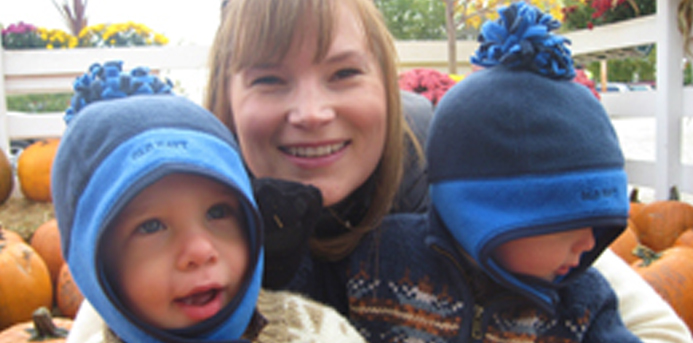Almost a year-and-a-half later, I still marvel at our new family dynamics.
Our fraternal twin boys were born in May of 2008—without the wonders of modern fertility medicine or a history of multiples in our family. In fact, the idea of conceiving twins was so far from my mental realm of possibility that it never even entered my mind.
It was during my first ultrasound appointment at eight weeks when I learned of my “dynamic duo.” I sat quietly in anticipation of seeing our baby—singular—for the first time as the technician spent countless minutes studying the monitor which was adjusted to face only her.
Without warning, she finally twirled it around and commented, “This is probably why you’ve been feeling so sick!” To my amazement, the screen clearly showed two, separate small circles, each with a large, ant-like looking creature inside. “Morning sickness tends to me more pronounced when you’re carrying twins,” she stated with a smile.
I started laughing hysterically and crying all at once. The incredible news was just too much to handle emotionally (especially for a pregnant lady)! And seriously, what are the odds this would happen to me? 1/89 to be exact.
If you’re not yet a parent or plan to expand your family, you may be wondering if you too might be a candidate for mothering twins, triplets or even more. It turns out, your chances are greater than ever: Twin births have risen nearly 60% since the early 1980s mainly due to advancements in fertility drugs and assisted reproductive technology.
The most recent general stats, part of a 2004 study by the National Center for Health Statistics, show twins represent about 1/32 births. The likelihood of having identical twins? About 1/250. Triplets, quadruplets, or more? 1/535.
These odds increase with influence from a variety of factors. While there isn’t consensus on the exact impact from fertility treatments, some estimate accounts for as many as 1/38 twin births.
Others estimate using the drug Clomid increases your chances of conceiving twins to as high as 1/5. Age is another factor. If you’re over age 45, your likelihood jumps to 17%.
Becoming a mother after 50 boosts your odds to nearly 1/9. Then there’s family history. If you, your mother, or your mother’s mother is a fraternal twin, chances may be as high as 1/17—the result of carrying a gene for hyperovulation that causes the release of more than one egg during an ovulation cycle.
And (I’m bracing myself for this one) if you’ve already had one set of fraternal twins, your chances of conceiving another set are 4 times greater than the average woman, or about 1/12!
Let’s just say my husband and I don’t plan to try for another set of twins anytime soon. Are you ready to try your odds?
Website recommendations:
www.momsofmultiples.org—local organization for Chicago and North Shore moms of twins
Reading recommendations:
“Twinspiration: Real-Life Advice From Pregnancy Through the First Year (for Parents of Twins and Multiples) ” by Cheryl Lage
“The Girlfriends’ Guide to Pregnancy ” by Vicki Iovine
“The Mother of All Pregnancy Books: The Ultimate Guide to Conception, Birth, and Everything In Between (U.S. Edition) ” by Ann Douglas
“What to Expect When You’re Expecting, 3rd Edition ” by Heidi Murkoff, Arlene Eisenberg and Sandee Hathaway, B.S.N.

